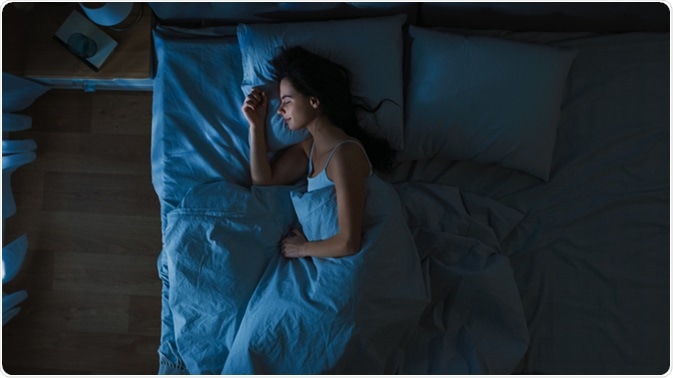Sleep is a physiological behavior that is common in all animal species. It forms around one third of a human life. It is not known clearly the exact functions of sleep but it seems to be essential for survival as prolonged sleep deprivation leads to severe physical impairment followed by cognitive loss and eventually death.
Sleep disturbances are important clinically as they are indicators of almost all types of psychiatric ailments.

Image Credit: Gorodenkoff / Shutterstock
Definition of sleep
Sleep is a state where awareness to environmental stimuli is reduced. Sleep is different from states of coma, hibernation and death by the fact that it can be rapidly reversed.
The Mind After Midnight: Where Do You Go When You Go to Sleep?
Phases of sleep
Like most other mammals, humans also show two types of sleep:-
- rapid eye movement (REM)
- non-rapid eye movement (NREM) sleep
Both these types of sleep have distinct features when evaluated using electroencephalogram or EEG.
EEG monitors the brain activities and electrical impulses within the brain during awake state and during sleep. REM and NREM sleep also differ from each other in terms of physical characteristics.
For example, during REM sleep the frequent bursts of eye movement activity occur. During REM sleep the EEG shows patterns similar to those when the person is awake. Thus it is a paradoxical state of sleep when the brain appears to be awake in terms of EEG but the individual is in deep sleep.
During NREM sleep there is decreased activation of the EEG. This is also called orthodox sleep. The brain appears to be calm.
Stages of sleep
Sleep is classified into stages. Each of the stages are almost distinct and for a cycle of sleep. These cycles tend to repeat more than once every night as the person sleeps.
To check the stages and phases of sleep visual scoring of three parameters are used. These include:-
- EEG – Records the brain’s electrical activities
- Electrooculogram (EOG) – this instrument records the eye movements
- Electromyogram (EMG) – this records the muscle tone and movement as the person sleeps. The records are made with a probe beneath the chin.
When a person is awake the there is a low voltage fast activity or activated pattern on EEG. There are eye movements and blinks despite closed eyes. These eye movements are voluntary. The EMG shows a high muscle tone. The EEG shows alpha activity (8-13 cycles per second).
Four stages of sleep
Once the sleep sets in there are four stages of sleep. Stage 1 sleep is the initial NREM phase. Here the alpha activity is lost. The pattern changes to low voltage mixed frequency EEG pattern and there are prominent theta activity (3-7 cps) with sharp waves interspersed on EEG. Eye movements slow down and muscle tone decreases.
During stage 1 the person is aware of the surroundings and may be roused easily. There may be sudden muscle contractions and a sense of falling or dreams.
Stage 1 lasts for a few minutes before progressing to stage 2. Here the EEG shows appearance of sleep spindles (12-14 cps) and K-complexes. These K complexes are high amplitude negative sharp waves followed by positive slow waves. This is also an NREM stage and is the beginning of sleep as perceived by the person.
Stage 2 is followed by stages 3 and 4. The EEG shows slow waves (< 2 cps in humans). Stage 3 and 4 are also referred to as slow wave sleep (SWS), delta sleep, or deep sleep. Arousal at this stage is difficult. Eye movements reduce as the person progresses from stages 2 to 4. EMG shows decreasing muscle tone.
After stages 1 to 4 of NREM sleep comes REM sleep. During REM sleep the EEG appears to be similar to stage 1 NREM sleep. There are theta waves (3-7 cps) and loss of muscle tone. The eyes move rapidly in bursts and there may be muscle twitches.
Duration of sleep
The amount of sleep varies among individuals. The usual requirement of sleep is around 7-9 hours of sleep per night. Some individuals may function well with less than 6 hours per night while some may need around 12 hours of sleep.
Are you getting enough sleep? This simple test will tell you... | World Sleep Day
Further Reading
Last Updated: Jun 19, 2023